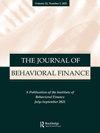Confirmation Bias in Analysts’ Response to Consensus Forecasts
IF 1.7
3区 经济学
Q3 BUSINESS, FINANCE
引用次数: 0
Abstract
This paper provides evidence of confirmation bias by sell-side analysts in their earnings forecasts. We show that analysts tend to put higher weight on public information when the current forecast consensus is more consistent with their previous forecasts. We further find that analysts with better past forecasting performance, longer firm-specific experience, or forecasting earlier, tend to be more subject to confirmation bias, consistent with some of the existing cognitive and social psychology theories. The results remain significant after controlling for analyst incentives. Finally, we distinguish evidence of confirmation bias from that of other important behavioral biases such as conservative bias.
分析师对共识预测反应中的确认偏差
摘要本文提供了卖方分析师在收益预测中存在确认偏差的证据。我们表明,当当前的预测共识与他们之前的预测更一致时,分析师倾向于给予公共信息更高的权重。我们进一步发现,过去预测业绩更好、公司特定经验更长的分析师,或预测更早的分析师,往往更容易受到确认偏差的影响,这与现有的一些认知和社会心理学理论相一致。在控制了分析师的激励后,结果仍然是显著的。最后,我们将确认偏差的证据与其他重要的行为偏差(如保守偏差)的证据区分开来。
本文章由计算机程序翻译,如有差异,请以英文原文为准。
求助全文
约1分钟内获得全文
求助全文
来源期刊

Journal of Behavioral Finance
Multiple-
CiteScore
4.60
自引率
10.50%
发文量
34
期刊介绍:
In Journal of Behavioral Finance , leaders in many fields are brought together to address the implications of current work on individual and group emotion, cognition, and action for the behavior of investment markets. They include specialists in personality, social, and clinical psychology; psychiatry; organizational behavior; accounting; marketing; sociology; anthropology; behavioral economics; finance; and the multidisciplinary study of judgment and decision making. The journal will foster debate among groups who have keen insights into the behavioral patterns of markets but have not historically published in the more traditional financial and economic journals. Further, it will stimulate new interdisciplinary research and theory that will build a body of knowledge about the psychological influences on investment market fluctuations. The most obvious benefit will be a new understanding of investment markets that can greatly improve investment decision making. Another benefit will be the opportunity for behavioral scientists to expand the scope of their studies via the use of the enormous databases that document behavior in investment markets.
 求助内容:
求助内容: 应助结果提醒方式:
应助结果提醒方式:


